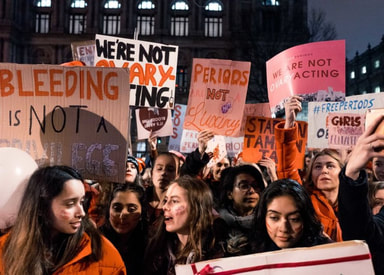 This article appeared in the print edition of the Evening Telegraph: 17/02/2020 I discussed various potential opportunities with my careers adviser before leaving high school but becoming a spokesperson for menstruation was never on my list. However, that became my lot a few years ago when an increasing number of women and girls presented at foodbanks across Scotland in need of sanitary items. Many women, due to circumstances beyond their control, were forced to supplement the use of sanitary items with socks, toilet roll and newspaper. My awakening came like a lightning bolt when, in 2010, one young lady came to Dundee Foodbank and turned down sanitary items stating she was too malnourished due to a lack of calories. From 2016, I was called upon for interviews with various media outlets to discuss what became known as “period poverty” and, in 2017, I and my colleagues submitted a detailed report to Aileen Campbell when she was the Minister for Public Health. Alongside other grassroots campaigns, this led to a pilot in Aberdeen followed by £9.2 million of Scottish Government investment to ensure sanitary provision in schools, universities, libraries and leisure facilities. In 2018, I retreated and assumed that was the job done until a fortnight ago when Aileen Campbell, now the Cabinet Secretary for Communities, opposed the bill on the free provision of period products. The architect of the bill, Scottish Labour’s Monica Lennon, has been the single most fervent champion for the universal provision of sanitary items. She and I met in Holyrood the day after the Local Government and Communities Committee voted by five to two against it, citing concerns over cost and implementation. Scottish Green MSP, Andy Wightman, highlighted that the principle of universalism is at stake and there is a need to counter the belief that you can institute rights without legislation. Monica said: “The driving principle of the bill is achieving period dignity for all.” She adds: “Legislation is essential to secure rights and protect the progress made so far. Means-testing menstruation is not practical or dignified – a universal approach is progressive.” The bill has support from the Scottish Labour Party, Scottish Green Party, Scottish Liberal Democrats and, in a live interview, the new leader of the Scottish Conservative Party, Jackson Carlaw, pledged support. SNP equivocation has infuriated members. Last week, I met the SNP Students National Equalities Officer, Stuart Smith, who has already secured significant support within his party including some elected members. He said: “We are the party of the baby box, universal education, free prescriptions and free personal care.” He adds: “There may be economic concerns but that is what stage two of the parliamentary process is for.” Nevertheless, on Tuesday 25 February, the bill will be presented and the SNP are at least four votes shy of a majority, which means if all other parties vote for it, we could see a political earthquake and irreparable damage done to the SNP claim they are the party of gender equality.
0 Comments
Leave a Reply. |
AuthorWrite something about yourself. No need to be fancy, just an overview. Archives
February 2024
Categories |
 RSS Feed
RSS Feed